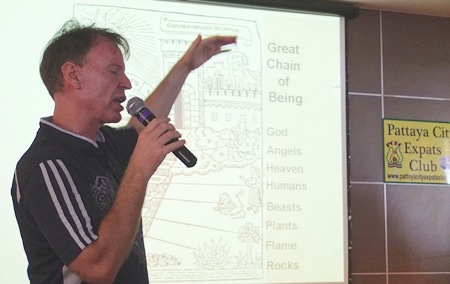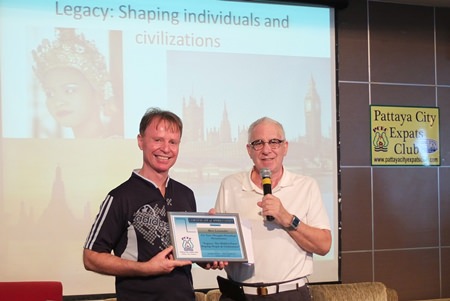Thailand has never been colonised, so Thais have never seen their top leaders being forced to bend their knees before anyone. Contrast that to the beheading of monarchs in France and England, and you start to get an idea of how history has influenced modern cultures.
This was one of the messages delivered by PCEC member Ren Lexander when he spoke at their Sunday, February 9 meeting on the topic “Legacy: Shaping Individuals and Civilisations.” Ren is an author who has had seven books published, including “Seduction by the Stars: An Astrological Guide to love, Lust and Intimate Relationships” (co-written with a professional astrologer); “Eye of the Shadow,” and “The Secret Meaning of Names.”
 Member Ren Lexander spoke at Pattaya City Expats Club meeting on Sunday, February 9, on the topic “Legacy: Shaping Individuals and Civilisations.”
Member Ren Lexander spoke at Pattaya City Expats Club meeting on Sunday, February 9, on the topic “Legacy: Shaping Individuals and Civilisations.”
Culture plays a huge role in shaping people and civilisations, Ren said, citing the Ten Commandments as an example. Most people who grew up in the Judeo-Christian traditions can’t recite all of the Ten Commandments, he said, but they are nevertheless shaped by them.
The Ten Commandments are very black and white (“Thou shalt not…”), Ren explained. Thailand, a Buddhist country, has no concept of the Ten Commandments. Instead, it has Buddha’s 8-fold path which talks about the “right” things to do – for example, right thought, right speech, and right action. For Thais, Len said, the “right” thing to do may include telling a lie if that is what keeps the other person from getting upset. That’s why Thais will say things they think will make you happy.
 MC Richard Silverberg presents Ren with a Certificate of Appreciation as thanks for his well researched presentation, which saw one of PCEC’s highest ever attendances.
MC Richard Silverberg presents Ren with a Certificate of Appreciation as thanks for his well researched presentation, which saw one of PCEC’s highest ever attendances.
Another example of how our cultures differ is marriage. For Westerners, Ren explained, when you marry someone you “forsake all others” and you start a new entity, a new family. Parents are relegated to the background. But for Thais, marriage is not the start of a new entity; one’s existing family remains important. The primary commitment is still to one’s parents.
Hierarchical chains are a feature of both cultures, Ren said, though it manifests itself differently. In Judaism, there was a strict chain, with God at the top, followed by angels and prophets. At the other end of the scale were women, lepers and non-Jews. Jesus upset this order for a while, but after his death the chain came back stronger than ever.
One manifestation of hierarchy in Thai culture is the family. Thais don’t refer simply to their bothers and sisters, Ren explained. Instead, they use words like “sister older,” “sister younger” and “brother younger.” Another manifestation is the body itself, where the head is considered sacred (“don’t touch a Thai person on the head in public”) and the feet are seen as the lowest and filthiest part of the body (“don’t point your foot at someone”).
In Ren’s opinion, the chain of command has dissipated somewhat in Western countries, but it is still very much present in the East. In the type of hierarchical society that exists in many Asian countries, communication often suffers because people are too deferential towards others higher up the chain than themselves. This can cause major problems, Ren said, such as when Korean Air lost airplanes at a rate 17 times the industry average. Workers in the company were afraid to speak plainly to their superiors about problems they had identified.
Ren said that this kind of deference is often embedded in the language. When the airline finally implemented measures to fix their ailing airline, one of the first things they did was to ban the use of the Korean language in the cockpit. Because of this and other changes, Korean Air is now one of the safest airlines to fly, Ren said.
 Senior Specialist from Bangkok Bank, Waraporn draws the winner of a gift basket, kindly donated by Bangkok Pattaya Hospital.
Senior Specialist from Bangkok Bank, Waraporn draws the winner of a gift basket, kindly donated by Bangkok Pattaya Hospital.
There is something called the “power distance index” or PDI. It was developed by a Dutch man. The PDI measures the extent to which subordinates or ordinary citizens submit to authority. Ren said that South Korea is the second highest country on the index, after Brazil. New Zealand and Australia have the lowest PDI. People in Australia will call anyone “mate” no matter how important they are. This is an example of very “flat” communication.
Democracy can also be seen as a very flat concept, Ren explained – one person, one vote. In that sense, it challenges hierarchies. Ren said that the people demonstrating in the streets of Bangkok are saying that there is more to democracy than one person, one vote. At the same time, many Thais think that the people of Isaan are below them in the hierarchical chain, so how can they be creating the government?
The notion of an apocalypse – i.e. a cataclysmic event that changes the existing order – has had a big impact on Western civilization, Ren said. Examples of apocalyptic events are Martin Luther and the reformation; the English civil war that led to the beheading of King Charles I; the French revolution; and the end of slavery in the United States. There is no similar concept in the tradition of Buddhist countries.
For people who want to delve further into this topic, Ren recommended two books: (1) “Outliers: The Story of Success” by Malcolm Gladwell; and (2) “Predictably Irrational: The Hidden Forces that Shape Our Decisions” by Dan Ariely.
After Ren answered many questions from the standing room only assembly, Master of Ceremonies Richard Silverberg brought everyone up to date on upcoming events and called on Roy Albiston to conduct the Open Forum where questions are asked and answered on Expat living in Thailand; particularly Pattaya.
For more information on the Club’s many activities, visit their website at www.pcecclub.org.




